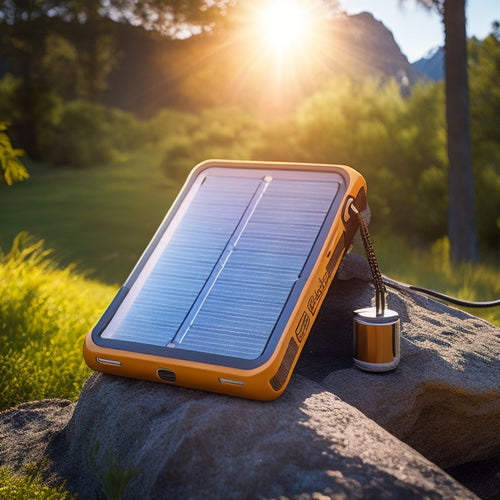
Maintaining and Troubleshooting Off Grid Battery Storage
Share
To maintain and troubleshoot your off-grid battery storage system, start by regularly monitoring the state of charge and depth of discharge. Cleaning terminals and guaranteeing proper ventilation can prevent overheating and corrosion. Invest in a quality battery management system to avoid overcharging and excessive discharging. If you're using lead-acid batteries, remember that flooded types require more maintenance, while sealed variants need less. For lithium-ion batteries, take advantage of their efficiency and longer lifespan. Proper maintenance not only maximizes energy efficiency but also enhances battery longevity. You'll find additional strategies and observations to ascertain ideal performance as you investigate further.
At a Glance
- Regularly monitor the state of charge and depth of discharge to prevent battery wear and ensure optimal performance.
- Perform routine maintenance, such as cleaning terminals and ensuring proper ventilation, to enhance battery lifespan and efficiency.
- Use a quality battery management system to prevent overcharging and excessive discharging, safeguarding battery health.
- Conduct energy audits to analyze consumption patterns and adjust battery capacity for ideal load management.
- Troubleshoot early signs of issues, such as overheating or reduced capacity, for timely interventions and repairs.
Longer Lifespan Than Alternatives
When you choose high-quality off-grid battery storage, you're investing in extended usage durability that outlasts many alternatives.
Selecting the right battery types and characteristics guarantees that you maximize your system's efficiency and longevity.
This means you'll experience fewer replacements over time, saving both money and resources.
Ultimately, a longer lifespan translates to greater efficiency and reliability for your energy needs.
Extended Usage Durability
Maximizing the lifespan of your off-grid battery storage system is essential for guaranteeing reliable energy access. To achieve extended usage durability, focus on regular battery maintenance and performance enhancement. Proper care not only increases efficiency but also prolongs the life of your batteries, enabling you to enjoy the freedom of sustainable energy.
Start by monitoring the state of charge and depth of discharge. Keeping your batteries within their ideal range can greatly reduce wear and tear. Additionally, regularly cleaning terminals and guaranteeing proper ventilation helps to prevent overheating and corrosion.
Consider temperature management, too; extreme heat or cold can adversely affect battery chemistry and lifespan. Insulating your battery bank can mitigate these risks, allowing for stable performance in varying climates.
Lastly, invest in a quality battery management system (BMS). A BMS guarantees that your batteries operate cohesively, preventing overcharging or excessive discharging, both of which can shorten their lifespan.
Reduced Replacement Frequency
By implementing proper maintenance and utilizing advanced battery technologies, you can greatly reduce replacement frequency, making your off-grid battery storage a more dependable investment.
Effective maintenance strategies, including regular battery monitoring and consistent charging practices, are vital for ensuring your system operates at peak performance.
Incorporating troubleshooting techniques can help you identify potential issues early on, allowing for timely intervention that prevents failure. This proactive approach not only extends the lifespan of your batteries but also enhances their performance, reducing the need for costly replacements.
Additionally, adopting practices that focus on lifespan extension, like avoiding deep discharges and maintaining ideal charging cycles, can considerably improve battery longevity.
It's important to evaluate the environmental impacts of battery disposal; longer-lasting batteries mean fewer replacements and less waste.
Cost-Effective Energy Solution
When considering off-grid battery storage, you'll find initial setup savings can notably reduce your upfront costs.
Selecting the right battery type options is essential, as it influences the overall performance and lifespan of your system.
Over time, these systems often yield long-term investment benefits, as their efficiency and durability lead to lower maintenance and replacement expenses.
Initial Setup Savings
Setting up an off-grid battery storage system can lead to significant initial savings, making it a cost-effective energy solution for many households. The initial cost of the system can be offset by careful planning and strategic installation choices. Here are some installation tips to help you maximize your savings:
| Installation Tips | Benefits |
|---|---|
| Choose the right battery type | Optimizes performance and lifespan |
| Employ solar panels | Reduces dependency on grid power |
| Invest in energy-efficient appliances | Lowers overall energy consumption |
| Properly size your system | Guarantees enough capacity without overspending |
Long-Term Investment Benefits
Investing in an off-grid battery storage system not only yields immediate savings during the setup but also provides substantial long-term financial benefits. By incorporating this technology into your energy strategy, you're not just buying equipment; you're making a commitment to sustainable energy independence.
With prudent financial planning, you can optimize your investment strategies. Off-grid battery systems help reduce reliance on fluctuating energy prices and can eliminate monthly utility bills. Over time, this translates to significant cost savings, enabling you to allocate resources elsewhere or reinvest in additional energy solutions.
Moreover, as energy storage technology evolves, your initial investment is likely to appreciate in value, offering potential returns if you choose to upgrade or resell. The savings on maintenance and operational costs further enhance your financial outlook.
Ultimately, embracing off-grid battery storage is about more than just immediate savings; it's about securing your energy future and gaining the freedom to operate independently from conventional power grids.
Battery Chemistry Variants
When considering battery options for off-grid storage, it's crucial to understand the two primary chemistry variants: lead-acid and lithium-ion.
Lead-acid batteries offer a proven, cost-effective solution, but they require regular maintenance, such as electrolyte monitoring and monthly equalizing, which can be a drawback for some users.
In contrast, lithium-ion batteries provide significant advantages in efficiency and lifespan, with systems like the Tesla Powerwall achieving an extraordinary 95% round-trip efficiency and up to 5,000 cycles at 50% depth of discharge high-capacity batteries.
Evaluating these options will help you determine the best fit for your energy needs.
Lead-Acid Batteries Overview
Lead-acid batteries are a staple in off-grid energy systems, known for their reliability and cost-effectiveness. They come in two primary variants: flooded and sealed (AGM or gel).
Flooded batteries require regular lead acid maintenance, including checking water levels and equalizing charges, which can be time-consuming but extends their lifespan considerably. Sealed batteries, on the other hand, are low-maintenance, as they don't require water additions, making them a convenient choice for those valuing ease of use.
In terms of performance, flooded batteries typically offer more capacity for the price, but they need proper ventilation due to gas emissions. Sealed batteries, while generally more expensive, are better suited for confined spaces and can handle partial discharges without damage.
When choosing lead-acid batteries for your off-grid system, consider your specific energy needs, installation space, and maintenance preferences.
With proper lead acid maintenance, you can optimize battery lifespan, ensuring your off-grid setup remains resilient and efficient. Remember, the right choice in battery chemistry can enhance your energy independence and provide reliable power for your lifestyle.
Lithium-Ion Advantages Explained
Exploring the advantages of lithium-ion batteries reveals a chemistry that greatly improves off-grid energy systems. These batteries excel in charging efficiency, allowing you to maximize your energy usage, which is vital for achieving independence from the grid.
Their high thermal stability means they handle fluctuations in temperature better than other chemistries, enhancing safety features and reducing risks of overheating.
In terms of performance metrics, lithium-ion batteries offer impressive discharge rates, ensuring that you have consistent power when you need it. They also exhibit minimal capacity degradation over time, leading to an extended cycle life—often surpassing that of traditional lead-acid batteries.
This longevity translates into fewer replacements, saving you time and resources.
When you consider the environmental impact, lithium-ion batteries shine with more efficient recycling processes compared to their counterparts. This means you can enjoy off-grid freedom while minimizing your ecological footprint.
Advanced battery management systems further optimize their performance, ensuring that your energy storage solution remains reliable and efficient.
Choosing lithium-ion technology enables you to utilize renewable energy confidently, knowing you've made a smart, sustainable choice for your off-grid lifestyle.
Selecting Based on Usage Patterns
To effectively select your off-grid battery system, start by analyzing your energy consumption patterns.
Understanding your daily usage helps in identifying high-power appliances, which is essential for determining the appropriate battery capacity you'll need. This guarantees that your storage solution aligns with your lifestyle and energy demands.
Additionally, considering top solar battery brands can provide perspectives into performance and efficiency that are important for your decision-making process.
Energy Consumption Analysis
When analyzing your energy consumption for an off-grid battery storage system, it's crucial to reflect on how your usage patterns affect overall efficiency and capacity. Start by evaluating your consumption patterns through energy audits, which help identify peak demand periods and inform your usage forecasting. This data is important for effective load management, allowing you to align your energy production with your consumption needs.
To enhance energy efficiency, implement monitoring tools for consumption tracking. These tools provide real-time information, enabling you to adjust your habits and practices. By understanding efficiency metrics, you can distinguish between necessary and non-essential loads, promoting sustainable practices that lead to reduced consumption during peak times.
Consider the impact of shifting usage patterns on your battery system. Adopting a proactive approach to load management can greatly improve your system's performance and longevity.
Regularly review your energy consumption and adjust as necessary, ensuring that your off-grid lifestyle remains both efficient and sustainable. By committing to this analysis, you'll equip yourself to make informed decisions that maximize your energy independence and enhance your freedom.
Battery Capacity Considerations
Understanding your energy consumption patterns directly influences the selection of your battery capacity. You'll want to focus on battery sizing that aligns with your typical usage to guarantee ideal load management. Analyze your daily energy needs, including peak loads, to determine appropriate discharge rates.
Remember that temperature effects can impact battery performance; operating in extreme conditions may require adjustments in capacity.
When establishing your battery capacity, consider the cycle depth. Deep cycling can lead to performance degradation, so it's essential to balance your usage with maintenance routines designed to prolong battery life. Aim for a charge efficiency that maximizes your system's performance while maintaining voltage stability.
Additionally, think about the environmental impacts of your battery choice. Selecting batteries that are recyclable or have lower ecological footprints can improve your off-grid experience.
Higher Energy Density Available
When you consider off-grid battery options, higher energy density can greatly enhance your system's efficiency.
With more energy stored in a smaller volume, you can reduce space requirements and weight, making installation easier.
This advantage not only improves performance but also allows for greater versatility in energy applications.
Advantages of Energy Density
With higher energy density batteries, off-grid energy systems can optimize storage capabilities, allowing for prolonged usage without frequent recharging.
This improved energy storage translates to a smaller physical footprint, which is vital for space-constrained installations like tiny homes or RVs. You get to enjoy more energy while reducing the weight and size of your battery bank.
Another significant advantage is the potential for efficiency improvements. Higher energy density means you can store more power in a smaller package, enhancing overall system efficiency.
This can lead to reduced energy losses during charging and discharging cycles, maximizing your usable energy.
Furthermore, with efficient energy storage, you gain greater autonomy from traditional power sources.
This independence not only lowers your carbon footprint but also enhances your resilience against grid outages and energy price fluctuations.
You're fundamentally taking control of your energy future.
Frequently Asked Questions
How Often Should I Check My Battery's Water Levels?
You should check your battery's water levels every month for ideal battery maintenance. Keeping them topped up guarantees efficient performance and longevity, enabling you to maintain independence and reliability in your off-grid energy system.
What Is the Ideal Temperature for Battery Storage?
The ideal temperature for battery storage is between 32°F and 77°F. Extreme temperatures can adversely affect battery chemistry, leading to reduced efficiency and lifespan. Keep your batteries within this range to optimize performance and longevity.
Can I Mix Different Battery Types in My System?
Imagine a mismatched puzzle; mixing different battery types can lead to compatibility issues, complicating charging strategies. Always prioritize battery compatibility to guarantee efficiency and longevity, giving you the freedom to utilize energy without limits.
How Do I Safely Dispose of Old Batteries?
To safely dispose of old batteries, investigate local battery recycling options or hazardous waste disposal facilities. Always follow guidelines to prevent environmental harm and guarantee responsible handling of materials that can be dangerous if mishandled.
What Signs Indicate My Battery Is Failing?
If your battery shows performance degradation, like reduced capacity or longer charging times, it's likely failing. Monitor its lifespan; significant voltage drops during use or swelling are also strong indicators that replacement is necessary.
Explore More
In the world of off-grid living, maintaining and troubleshooting your battery storage is essential for longevity and efficiency. By understanding the subtleties of battery chemistry and selecting the right type based on your usage patterns, you can guarantee your energy solution remains cost-effective and reliable. Imagine a serene evening, free from the hum of the grid, as your energy-efficient batteries power your home, providing a sustainable refuge that thrives even in the most challenging conditions.
Related Posts
-

Solar Phone Chargers for Camping Essentials
Solar phone chargers are must-haves for your camping essentials, allowing you to stay connected while enjoying nature...
-

Fastest Solar Chargers for Emergency Power
When choosing the fastest solar chargers for emergency power, you need to focus on features like rapid charging capab...
-

Cost of Solar With Battery Backup
You're investing in a solar panel system with battery backup to guarantee reliable power during outages. The cost of ...


